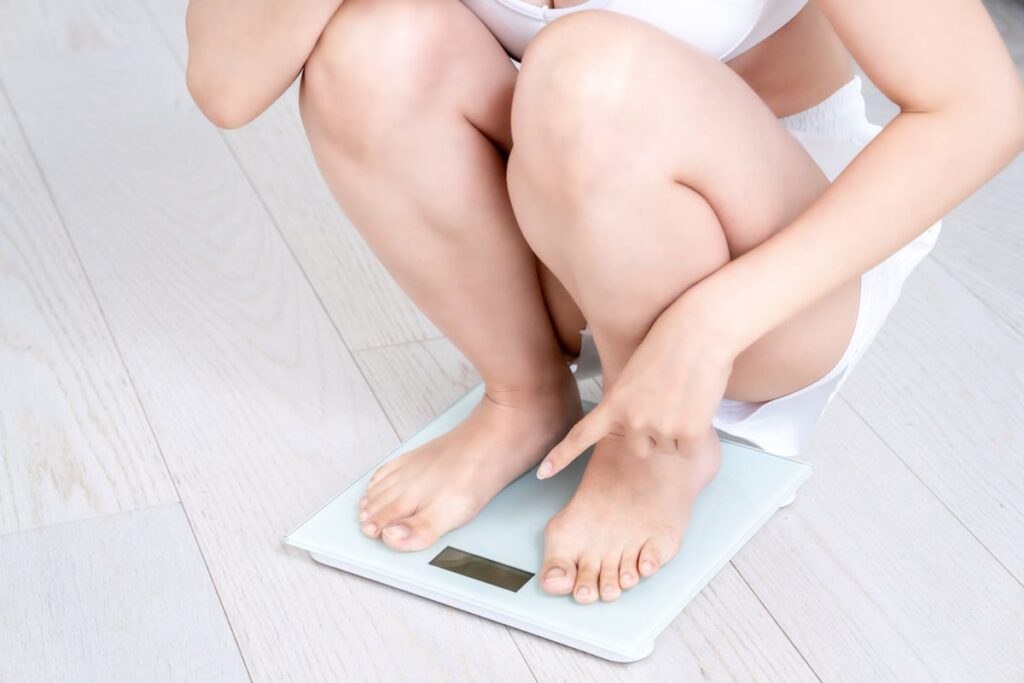[ad_1]
How to lose weight: Burn it? Or poop it out? The Japanese pharmaceutical market saw its first over-the-counter weight-loss drug hit last week. Will its side effects turn people away? The release also raises the question: what’s the market for a weight loss drug in one of the least obese nations on Earth?
Losing weight in the gym toilet

Japan’s first-ever nonprescription anti-obesity drug hit the market last week. But it may make users fart or leak oil.
Under the brand name “Alli,” pronounced a-ra-i (アライ) in Japanese, the fat-reducing medication orlistat became available over-the-counter (OTC) in Japan on April 8th. Until now, traditional Chinese herbal medicines were the sole OTC option for obesity treatment.
Orlistat promotes weight loss by blocking the absorption of dietary fat in the intestines. Since the U.S. Food and Drug Administration approved the drug in 1999, it has entered markets in Australia, New Zealand, the EU, Switzerland, and GCC countries.
Japanese multinational pharmaceutical company Taisho Pharmaceutical received approval from the Health Ministry last November to manufacture and sell Alli OTC.
Alli prevents the buildup of visceral fat by making users poop the fat from food out. Users can expect “discharging approximately 25% of dietary fat as excrement,” resulting in a 3% reduction in body weight, according to Taisho Pharmaceutical.
Advertisements
Losing weight (and face)
Fat may also trickle out on its own or blow out with gas, the company admits. Users consuming diets higher in fat “will more easily experience leakage of oil, farts accompanied by stool or oil, and oily stool” and should, therefore, “avoid meals with a lot of fat to alleviate such side-effects,” the company website says.
In addition to recommending low-fat diets, the company also suggests the following word-to-word:
- Use period pads
- Have extra underwear prepared
- Go to the bathroom as soon as you feel a fart coming or feel like you need to poop
The company says it takes 4 weeks before Alli users can see the scale move, which may be too long to endure considering the leaky tradeoffs.
One X user wrote “In exchange for losing weight, you are socially done. It is truly a double-edged sword! Or is it really a fair trade!”
Rather than invest ¥8,800 (about $57) a month on Alli which makes users dump out 4,000 kilocalories worth of dietary fat, another X user vows to lose weight in the old-school style.
“I don’t want oil leaking out, so I’ll drop my weight by seriously reducing my meals and exercising.”
Fair point, considering that people can burn more calories by walking for one hour than if they poop calories out by downing 3 Alli capsule pills every day.
Who is Alli for?

Alli is as much controversial as it is hard to procure. The drug is only available to overweight adults above the age of 18 with a waist circumference of 85cm for men and 90cm for women. Users’ BMI must be no higher than 35.
Pregnant or breastfeeding women are not allowed to take Alli. Patients with dyslipidemia, a condition of having unhealthy levels of fats in the blood, or high blood pressure are also banned from its use.
Still, people who meet all criteria for using Alli cannot just walk in and out of a pharmacy with the product in hand. People who wish to purchase Alli must make lifestyle changes in the three months before starting to take the drug.
Taisho Pharmaceutical confirms this by having people fill out a checklist and daily log that tracks meal and exercise habits as well as waist circumference and weight. People must submit this record to a pharmacist one month before starting Alli to buy the drug.
The daily log asks people to rate their meals based on whether they reduced the amount of food consumed, snacked less, and drank less alcohol. For rating their exercise, people report whether they increased their activity, daily steps, and overall movement.
The pressure to stay thin

Will Alli be a hit in Japan? That remains to be seen.
According to the US Central Intelligence Agency’s Word Factbook, Japan is already one of the thinnest nations on Earth. It ranks 187 out of 193 countries with an obesity rate of 4.5%. While that number’s gone up in recent years, it’s nowhere close to number 1 ranked Tonga (71%) or even the 13th-ranked United States (42.7%).
There’s already a lot of pressure on people – particularly women – to stay thin. This pressure can even be dangerous. In 2018, the terms “Cinderella weight” (シンデレラ体重; shinderera taijuu) and “BMI18” (Body Mass Index 18) trended on Twitter as some women aimed for a BMI of 18 as the “ideal” female weight. Most physicians agree that, for women, anything under a BMI of 18.5 is unhealthy.
YouTube in Japan has also come under fire in recent years for running weight loss and diet ads that encourage unhealthy behaviors. For example, one series of ads depicted a woman losing 30kg (66lbs) in a month – a far cry from the recommended monthly maximum of 4.5kg (10lbs).
While the hurdle for obtaining Alli is high, there’s little doubt a black market for it will develop in the near future. We can only hope it doesn’t cause more harm than good.
Sources
気づいたらお尻から油が…国内初の脂肪を減らす薬「アライ」の発売に高まる期待も副作用に不安の声「デメリットでかい」「痩せると引き換えに社会的に終わる」. AMEBA TIMES
市販薬で肥満対策、日本でも 大正製薬「アライ」発売. 日本経済新聞
内臓脂肪減少薬「アライ」販売開始 大正製薬、日本初の市販薬. 毎日新聞
List of countries by obesity rate. Wikipedia JP
[ad_2]
Source link




